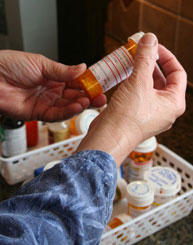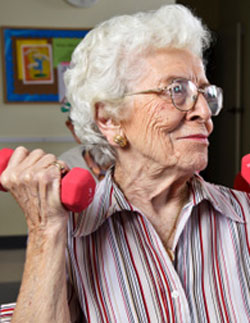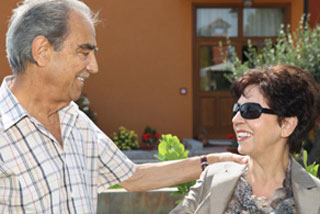What to Do
Reduce Fall Risks
If you know a person is at risk for a fall, take these steps to lessen their risk.

- Review Medicines – When the person you care for is on more than 6 medicines, including over-the-counter medicines, review the list of medicines with their doctor or pharmacist. It is best to have one doctor in charge of the person’s medical condition and one pharmacy to fill prescriptions. Be sure the doctor also knows about any medicines ordered by a specialist. Be alert if you care for an older adult who gets a prescription changed.

Tai Chi is one form of martial art. It is a mind-body practice sometimes called "moving meditation"—persons move their bodies slowly, gently, and with awareness, while breathing deeply. During Tai Chi exercise the body is in constant motion, and good posture is very important.

- Clean the person’s glasses routinely before he or she gets up to walk
- Remove any glare in the home, by using sheer curtains or shades across windows. Non-gloss or satin finishes on walls and countertops also reduce glare.
- Have the person wear sunglasses when walking outside
- If a person needs help to get to the bathroom, ask regularly (every hour or two) during the day if they need to go.
- If the person takes a diuretic medicine (“water pill”) give it in the morning not at night.
- Be sure the person has a night light or can easily reach a light switch from the bed. Place a night light in the bathroom, too. Turning on a bright light after coming from a dark room can be blinding.
When a Person Falls
Most falls do not involve injuries or the injuries are minor and do not require a trip to the emergency room. Yet proper care is needed.
- If a person falls, do not try to move him or her. Wait and check to see if the person is hurt. Ask the person to tell you if he or she feels hurt and if so where. Have the person lie still for a few minutes before trying to move him or her.
- Then help the person to stand (See our lesson on Moving Safely in in the Home).
- If a person falls and can't remember falling, he or she likely fainted. Fainting can be due to many different problems. Report this to the person’s doctor immediately.
- Call 911 if the person:
- Hit their head and is unconscious or difficult to awaken.
- Has a hard time breathing,
- Is bleeding from the head or face
- Has a severe headache
- Has slurred speech
- Becomes confused about where he or she is
- Has repeated vomiting
- Has a seizure (sudden uncontrollable muscle jerking)
- Is unable to move or stand without having severe pain in their legs or lower body
- If there is any bleeding from a scrape or gash:
- Take a clean cloth or gauze bandage and apply gentle pressure for 20 minutes. Do not release the pressure. If the blood spurts or flows after holding pressure Call 911.